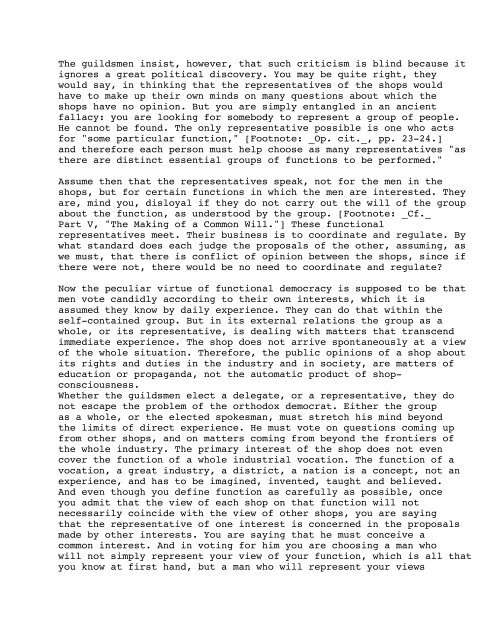PUBLIC OPINION by WALTER LIPPMANN TO FAYE LIPPMANN ...
PUBLIC OPINION by WALTER LIPPMANN TO FAYE LIPPMANN ...
PUBLIC OPINION by WALTER LIPPMANN TO FAYE LIPPMANN ...
Create successful ePaper yourself
Turn your PDF publications into a flip-book with our unique Google optimized e-Paper software.
The guildsmen insist, however, that such criticism is blind because it<br />
ignores a great political discovery. You may be quite right, they<br />
would say, in thinking that the representatives of the shops would<br />
have to make up their own minds on many questions about which the<br />
shops have no opinion. But you are simply entangled in an ancient<br />
fallacy: you are looking for somebody to represent a group of people.<br />
He cannot be found. The only representative possible is one who acts<br />
for "some particular function," [Footnote: _Op. cit._, pp. 23-24.]<br />
and therefore each person must help choose as many representatives "as<br />
there are distinct essential groups of functions to be performed."<br />
Assume then that the representatives speak, not for the men in the<br />
shops, but for certain functions in which the men are interested. They<br />
are, mind you, disloyal if they do not carry out the will of the group<br />
about the function, as understood <strong>by</strong> the group. [Footnote: _Cf._<br />
Part V, "The Making of a Common Will."] These functional<br />
representatives meet. Their business is to coordinate and regulate. By<br />
what standard does each judge the proposals of the other, assuming, as<br />
we must, that there is conflict of opinion between the shops, since if<br />
there were not, there would be no need to coordinate and regulate?<br />
Now the peculiar virtue of functional democracy is supposed to be that<br />
men vote candidly according to their own interests, which it is<br />
assumed they know <strong>by</strong> daily experience. They can do that within the<br />
self-contained group. But in its external relations the group as a<br />
whole, or its representative, is dealing with matters that transcend<br />
immediate experience. The shop does not arrive spontaneously at a view<br />
of the whole situation. Therefore, the public opinions of a shop about<br />
its rights and duties in the industry and in society, are matters of<br />
education or propaganda, not the automatic product of shopconsciousness.<br />
Whether the guildsmen elect a delegate, or a representative, they do<br />
not escape the problem of the orthodox democrat. Either the group<br />
as a whole, or the elected spokesman, must stretch his mind beyond<br />
the limits of direct experience. He must vote on questions coming up<br />
from other shops, and on matters coming from beyond the frontiers of<br />
the whole industry. The primary interest of the shop does not even<br />
cover the function of a whole industrial vocation. The function of a<br />
vocation, a great industry, a district, a nation is a concept, not an<br />
experience, and has to be imagined, invented, taught and believed.<br />
And even though you define function as carefully as possible, once<br />
you admit that the view of each shop on that function will not<br />
necessarily coincide with the view of other shops, you are saying<br />
that the representative of one interest is concerned in the proposals<br />
made <strong>by</strong> other interests. You are saying that he must conceive a<br />
common interest. And in voting for him you are choosing a man who<br />
will not simply represent your view of your function, which is all that<br />
you know at first hand, but a man who will represent your views





